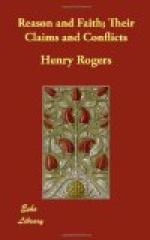we acquire the imperfect knowledge which is to fit
us for being men; but to the very last we may be truly
said to believe far more than we know. ‘Indeed,’
said Butler, ’the unsatisfactory nature of the
evidence with which we are obliged to take up in the
daily course of life, is scarce to be expected.’
Nay, in an intelligible sense, even the ’primary
truths,’ or ‘first principles,’ or
‘fundamental laws of thought,’ or ‘self-evident
maxims,’ or ‘intuitions,’ or by whatever
other names philosophers have been pleased to designate
them, which, in a special sense, are the very province
of reason, as contra-distinguished from ‘reasoning’
or logical deduction, may be said almost as truly to
depend on faith as on reason for their reception.*
For the only ground for believing them true is that
man cannot help so believing them! The same may
be said of that great fact, without which the whole
world would be at a stand-still—a belief
in the uniformity of the phenomena of external nature;
that the same sun, for example, which rose yesterday
and to-day, will rise again tomorrow. That this
cannot be demonstrated, is admitted on all hands;
and that it is not absolutely proved from experience
is evident, both from the fact that the uniformity
supposed is only accepted as partially and transiently
true; the great bulk of mankind, even while they so
confidently act upon that uniformity, rejecting the
idea of its being an eternal uniformity. Every
theist believes that the order of the universe once
began to be; and every Christian and most other men,
believe that it will also one day cease to be.
____
* Common language seems to indicate this: Since
we call that disposition of mind which leads some
men to deny the above fundamental truths (or affect
to deny them), not by a word which indicates the opposite
of reason, but the opposite of faith,—Scepticism,
Unbelief, Incredulity. ____
But perhaps the most striking example of the helplessness
to which man is soon reduced if he relies upon his
reason alone, is The spectacle of the issue of his
investigations into that which one would imagine he
must know most intimately, if he knows anything; and
that is, his own nature—his own mind.
There is something, to one who reflects long enough
upon it, inexpressibly whimsical in the questions which
the mind is for ever putting to itself respecting
itself; and to which the said mind returns from its
dark caverns only an echo. We are apt, when we
speculate about the mind, to forget for the moment,
that it is at once the querist and the oracle:
and to regard it as something out of itself, like
a mineral in the hands of the analytic chemist.
We cannot fully enter into the absurdities of its
condition, except by remembering that it is our own
wise selves who so grotesquely bewilder us. The
mind, on such occasions, takes itself (if we may so
speak) into its own hands, turns itself about itself,
listens to the echo of its own voice, and is obliged,




